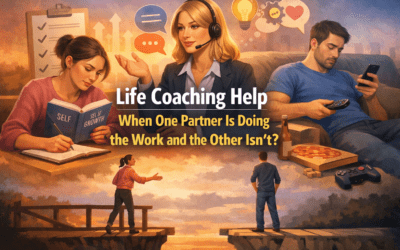What to Do When Your Partner Reopens the Argument After Conflict Resolution
By Wendy Lynne | Life & Relationship Coach
Helping driven professionals create emotional freedom, deeper connection, and conscious relationships
The Hidden Strain Behind Reopened Fights
You know the pattern: after a long talk, tears, and effort, you finally reach conflict resolution in your relationship. You feel a moment of peace.
And then your partner brings the issue back up. Again.
It’s not framed as a fight this time. Maybe it’s a “clarification” or “just one more thing,” but it reopens the emotional wound. The progress made? It unravels. You’re right back in the argument, feeling exhausted, defeated, and like nothing ever truly sticks.
This cycle, when one partner reopens the argument after a fight, is more common than most couples realize. It creates emotional fatigue and gradually erodes trust and intimacy in relationships.
As a life and relationship coach for couples, I’ve helped many partners work through this exact issue. Here’s why it happens and how to stop it from draining your connection.
Why Couples Reopen Arguments After Conflict Resolution
If your partner constantly rehashes a disagreement after you’ve made peace, it’s likely not as much about control as it is about emotional safety.
The Cycle Looks Like This:
- A disagreement escalates.
- One partner (often the more emotionally attuned) guides the couple toward reconnection and repair.
- A temporary peace is reached.
- The other partner, now calmer, begins to realize their side wasn’t fully expressed.
- Instead of waiting for the right moment, they immediately reopen the issue, hoping to assert their experience.
To the partner who initiated repair, it feels like betrayal:
“We just made up. Why are we back here again?”
To the partner reopening it, it feels like justice:
“I didn’t get to say what I needed to say.”
This leads to what I call emotional whiplash in relationships—a sense that connection is fleeting and arguments are never truly finished.
What’s Really Driving This Pattern?
This dynamic is often rooted in fear of being unseen, overpowered, or misunderstood, especially in people who grew up in environments where expressing needs was unsafe.
One or both partners may unconsciously believe:
- “If I don’t restate my side, it’ll be erased.”
- “I need to make sure I didn’t ‘lose’ this argument.”
- “I can’t relax unless I’m sure I was heard.”
What they don’t realize is that this defensive move reopens wounds and undermines emotional repair. That’s why it’s critical to build new tools for post-conflict trust.
How to Stop the Cycle of Reopening Arguments

Here are powerful tools to help couples stay connected after resolution, without the emotional boomerang.
1. Name the Pattern Without Blame
Language like this creates awareness without shaming:
“I notice we sometimes go back into the issue even after we make up. I wonder if that’s a way of making sure your voice was heard—but to me, it feels like we’re starting over.”
This is a skill I teach often in conscious communication coaching: describe the dynamic, not the person.
2. Create a Cooling-Off Agreement
Make a couple’s agreement like:
“After we reconcile, we each take 24 hours before revisiting any lingering concerns.”
This helps both people build emotional regulation and trust. You’re not avoiding the issue; you’re giving it a safer container.
3. Anchor the Repair Before Moving On
If your partner tends to reevaluate, try saying:
“I know this still matters to you. Can we give it space for now so we don’t undo the peace we just built? I promise we’ll come back to it when we’re grounded.”
This honors both people: the need to be heard and the need to protect your emotional bandwidth.
4. Recognize the Nervous System at Play

This pattern often isn’t about willpower; it’s about unhealed emotional patterns. Once a partner’s fight-or-flight system calms, they may “regroup” and re-engage.
Learning to regulate your nervous system in relationships is essential. That’s why in my coaching work, I help clients develop tools to pause, breathe, and choose connection over reactivity.
A Real-Life Client Example: The “Last Word” Loop
One client said:
“After every fight, we would hug or apologize and then five minutes later, he’d say, ‘But you still need to understand my side…’ I felt like peace was never real.”
Through coaching, she learned to say:
“I hear you. Your point matters. But bringing it up now undoes the peace we just created. Can we revisit this tomorrow when we’re calmer?”
It was a simple phrase, but it changed everything. Her partner began to realize his tendency to reassert his point was actually driven by fear, not clarity.
What If You’re the One Who Reopens?
If you’re the partner who tends to revisit the fight, try asking yourself:
- Do I trust that my voice matters even when the fight ends?
- Can I tolerate the discomfort of not being “fully understood” in the moment?
- Am I trying to protect my truth or prove I didn’t lose?
Give yourself grace. But also learn to pause. Write your thoughts down, and revisit them later, when your partner isn’t already drained.
Reconnection After Conflict Is Sacred – Protect It

One of the most important relationship skills isn’t just resolving conflict, it’s protecting the peace once you’ve reached it. This moment of reconnection is fragile, and when one partner keeps re-opening the wound, it eventually leads the other to stop trying.
That’s when real disconnection sets in, not from a lack of love, but from pure emotional burnout.
Tools That Help Couples Shift This Pattern
- Awareness of the loop
- Gentle interruption phrases
- Timing agreements
- Nervous system regulation
- Commitment to long-term safety over short-term reassertion
These are all tools I offer in my relationship coaching sessions, where we don’t just talk about communication, we practice it in real-time.
Final Thoughts: You’re Not Broken – You’re Learning
This cycle doesn’t mean your relationship is doomed. It means you’re being invited to grow—to learn how to stand for your truth without weaponizing it, and to offer peace without giving up your voice.
If you’re in this loop, don’t go it alone. You can learn new ways of relating that are rooted in emotional safety, respect, and sustainable connection.
Ready to Break the Cycle?
I help couples and individuals move beyond survival-mode relationships into deep, lasting connections.
Schedule a free clarity call
Explore Relationship Coaching with Wendy Lynne







Recent Comments